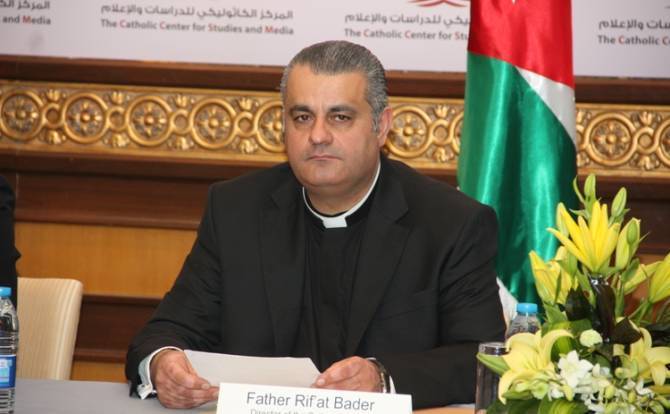Jordan can set a model to the world for common living despite religious variations, said Director of the Catholic Center for Studies and Media (CCSM) in Jordan Fr. Dr. Rif’at Bader.
“People are scared of terrorism not only in the Middle East, but also in the entire world. What is needed are wise religious and political leaders. But if these leaders fail, then citizens have to work for peace,” said Fr. Bader.
Following is the text of the interview:
Question: Jordan is an Islamic country, but we can find there one of the oldest Christian communities. What is the secret behind peaceful common living?
Fr. Bader: “The religion of the country is Islam, but at the same time Christianity is not banned. So, we can see for example churches and mosques built next to each other. The wisdom of the Jordanian leadership implied treating all segments of the society equally. This is how His Majesty King Abdullah II runs the country as was the case with his father and grandfather. Because of freedom of worship, Christians can contribute to building the future of their country and society peacefully. Furthermore, Jordan has religious significance as Lord Jesus Christ was baptized in the River Jordan and several prophets crossed this land which became considered a holy land.”
Question: What are the roles played by the Christians in Jordan nowadays?
Fr. Bader: “Christians constitute 3 per cent of the society, and they greatly contribute to the economic growth. Banks, firms, factories, companies are led by Christians. They are in high positions in the parliament or in the government. Christians in Jordan always serve the entire population. Our first role is spiritual which implies supporting Christians. It also involves education for everyone and charity which is reflected in supporting poor families and the refugees. We have numerous churches, schools, and universities. Both Christians and Muslims can attend these Christian-run educational institutions. We have some 100 schools, where 70 per cent of the students are Muslims. We are proud of this, because we can serve the whole society with our high-toned education. Hungary participates in our education. Many of our students study receive scholarships to pursue higher studies in Hungarian universities. Hungary helps Christian communities and church as well as the refugees of the Middle East. It is not true, that every Christian community is persecuted in our region, because our wise leadership protects us, and we can live in peace in Jordan.”
Question: Your country is said to be the most open Muslim country.
Fr. Bader: “Yes, in practice we have not any problems, for example we celebrate Christmas together as it is a national holiday. This time you can see Christmas decorations in the streets and Christmas trees installed in public squares. Christmas was recognized as a national holiday two years ago and we all celebrate it together. I am proud that we are Christian Jordanians and that our celebrations are appreciated.
Question: How was this cooperation realized in practice?
Fr. Bader: Inter-religious dialogue began last century by holding annual conferences that support common living among the followers of religions. Furthermore, several conferences are being held in Jordan in addition to the numerous initiatives launched, the most important of which is the Amman Message which was issued 15 years ago, or the World Interfaith Harmony Week that we established in the United Nations and was universally accepted. His Majesty King Abdullah received two awards in a period of six months from Washington and Rome owing to his efforts in support of harmony and religious common living as well as rejection of intolerance. The truth is that Jordan conveys the message of religious cooperation to the entire world and to our neighboring countries.
Question: Most of the refugees live in Jordan. How can you handle it?
Fr. Bader: “One-third of Jordan’s population is refugees as this does not apply to Palestinians, since they are part of Jordanian society. During the first Gulf War 1990-1991, many Iraqis came to Jordan as refugees. The year 2003, due to the so-called “setting the American democracy”, Iraqi refugees came to Jordan. After al-Qaeda organization attacked the Christians of Iraq, many of them came to Jordan including the Christians of Mosul in addition the over a million refugees who sought refuge in Jordan following the Syrian crisis.”
Question: Western Europe has the same problem, but the cooperation and coexistence has not been realized.
Fr. Bader: “Europe faces the hardest problem with regards to the integration of the refugees in their societies. But if refugees go back home, they cannot give a better future to their children. Since there is no more faith in their governments, nobody can promise them a safe and peaceful life as well as there are no guarantees that their homes will not be attacked again. Terrorism has instilled fear in the hearts of people, not only in the Middle East but throughout the world. We can see this at the airports everywhere and everyone fears terrorism. But everyone has the right for a better life.”
Question: As Christians what can we do against this in Jordan or in Hungary? How can we help the new generation to be a happy one?
Fr. Bader: “This is the most important question. The question is how can we guarantee work for them? But we have to knock on all doors and fight our fear. We must be wise and patient. We must redefine religion as a way of joy, not fear, and get people acquainted with God as a friend and a father. Today we need wise political and religious leaders. Even if politicians fail, we must have the capacity to work together, as Pope Francis said: “We must teach the generations to come the culture of meeting, the art of welcoming others, and the ability to work together for a better future.”






